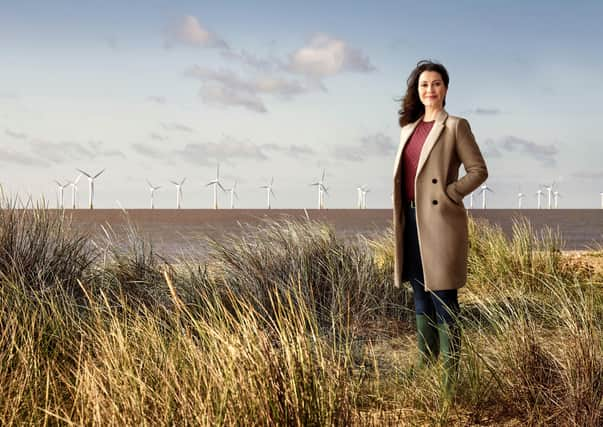Weekend interview: the new ally fighting for Yorkshire’s green exporters


Appointed by UK Export Finance (UKEF) as one of the North of England’s export finance managers, she’s been given the brand-new remit of focusing on renewable energy exports – an increasingly important industry for the world, which needs it, and for Yorkshire, which provides it.
Just three months into the job, she’s clear that the move has come at exactly the right time.
Advertisement
Hide AdAdvertisement
Hide Ad“I just feel like we’re going to go into a new world; clean growth and clean tech is going to accelerate,” she told The Yorkshire Post.
“I thought it was going to accelerate back in 2010, when I first moved into it. The Climate Change Act came and I thought, clean tech: it’s going to happen!
“I think now because of Covid and the Government’s Ten Point Plan [for a Green Industrial Revolution], we’ve got so many wheels in motion around this that I think it’s finally about to really ramp up a stage.”
UK Export Finance is the UK’s export credit agency and a ministerial department. It provides guarantees to banks in support of working capital and bond support schemes, and also ensures that UK exporters get paid by insuring them against buyer default.
Advertisement
Hide AdAdvertisement
Hide AdFounded just over 100 years ago, it’s had plenty of time to hone its craft; Global Trade Review has named it the world’s best export credit agency three years in a row.
“We basically have a mission to ensure that no viable UK export fails through lack of finance or insurance from the private sector,” says Ms Ashley, who moved to Britain from her native Australia 12 years ago.
“So we typically step in where the private sector can’t. We work with banks predominantly, but in some of our international activities we provide direct lending.”
A UKEF bond facility recently enabled Hull-based North Sea Ventilation to export £1.32m of its heating, ventilating, air-conditioning and refrigeration equipment to China. It also helped Danish energy company Ørsted Wind Power to export British-made equipment to Denmark by providing £22,000 of bond support for the contract.
Advertisement
Hide AdAdvertisement
Hide AdOver the last two years, UKEF has issued £500m of support to finance offshore wind projects in Taiwan, creating trading opportunities for UK companies.
In the 12 months before the Covid-19 pandemic hit, UKEF provided £4.4bn in support for British exports, helping UK companies trade with 69 countries.
Ms Ashley’s role is to work with energy companies in the North to help them secure finance for export contracts and connect them to clean tech projects overseas, and to that end she’s currently leading a major project to map the sector’s UK supply chains in the North.
“It is not a straightforward exercise!” she says. “I am systematically trying to get all the trade association data collated and crunch it and really focus on the companies I think we can help. In the future, I want to have an exhaustive list of those companies, and as these new opportunities emerge for projects overseas I can very quickly bring northern companies into those projects as they progress.
Advertisement
Hide AdAdvertisement
Hide Ad“But a lot of these clean-growth companies are new – they’re SMEs – and that’s a really key part of my role: finding out who these companies are, understanding their export potential, and making sure our products are actually going to meet their requirements.”
She has her work cut out – the North, and Yorkshire in particular – has a growing ecosystem of companies in the sustainable energy sector, from large employers, such as Siemens and Ørsted, right down to the SMEs that Ms Ashley speaks of.
Collectively, they are helping to put the UK at – or very near – the forefront of the global renewable energy industry.
“You have Hornsea One on your doorstep, off the Yorkshire coast,” says Ms Ashley. “It’s the biggest wind farm in the world. There’s so much engineering expertise here, and the rest of the supply chain that’s around that wind-farm is also going to be in demand overseas. I know from discussions recently that the US is very much interested in our capabilities in offshore wind.
Advertisement
Hide AdAdvertisement
Hide Ad“There’s hydrogen power expertise too. In Sheffield we have ITM Power, which is one of a very small number of PEM electrolyser manufacturers. There’s a lot of interest in that company at the moment from places like Colombia and Chile.”
While the news is full of stories of blockages at ports and export trade slowing to a trickle, Ms Ashley is bullish about her adoptive region’s ability to rise to the twin challenges of Covid and Brexit.
“There’s a lot of entrepreneurial people in the North, who I think just want to get on with it and address the issue as it arises, as opposed to talking about what might or might never be. So I’m very encouraged by that. That ‘let’s just get on with it’ attitude is one of the things I like about working in the North,” she says.
It’s an approach that clearly strikes a chord.
“I’m never shy in coming forward and speaking up on behalf of the exporters on my patch,” she says.
“At the end of the day, I want to be able to help companies and I want to make sure that if we can’t do it for some reason, then how do we fix that?”